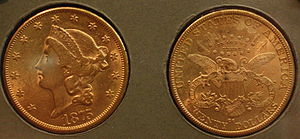Hard money (policy)


Hard money policies support a specie standard, usually gold or silver, typically implemented with representative money.
In 1836, when President Andrew Jackson's veto of the recharter of the Second Bank of the United States took effect, he issued the Specie Circular, an executive order that all public lands had to be purchased with hard money.
Bentonian currency
In the US, hard money is sometimes referred to as Bentonian, after Senator Thomas Hart Benton, who was an advocate for the hard money policies of Andrew Jackson. In Benton's view, fiat currency favored rich urban Easterners at the expense of the small farmers and tradespeople of the West. He proposed a law requiring payment for federal land in hard currency only, which was defeated in Congress but later enshrined in an executive order, the Specie Circular.[1]
See also
- Gold standard
- Silver standard
- Bimetallic standard
- Bullion coin
- Digital gold currency
- Fractional reserve banking
- Free banking
- Hard money (disambiguation)
- Libertarianism
- Bitcoin
References
- ^ Violette, Eugene (1918). History of Missouri. New York: D.C. Heath & Co. p. 275.
Further reading
- How Gold Coins Circulated in 19th Century America David Ginsburg
- North, Douglas C. (1966). The Economic Growth of the United States 1790–1860. New York, London: W. W. Norton & Company. ISBN 978-0-393-00346-8.
